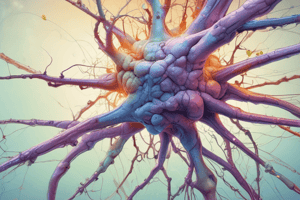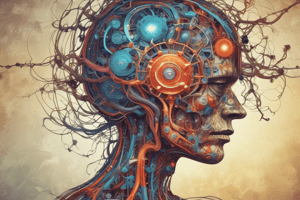Podcast
Questions and Answers
What role does Bromocriptine play in the context of dopamine?
What role does Bromocriptine play in the context of dopamine?
- It acts as a dopamine agonist. (correct)
- It serves as a dopamine antagonist.
- It increases acetylcholine levels.
- It inhibits dopamine receptor stimulation.
What are peripheral effects of dopaminergic drugs?
What are peripheral effects of dopaminergic drugs?
- Nausea and vomiting. (correct)
- Muscle twitching and ataxia.
- Blurred vision and mental changes.
- Anxiety and fatigue.
Which of the following accurately describes anticholinergic drugs?
Which of the following accurately describes anticholinergic drugs?
- They block acetylcholine receptors more in the periphery than in the CNS.
- They oppose the effects of dopamine.
- They increase the effects of acetylcholine in the CNS.
- They have a greater affinity for acetylcholine receptors in the CNS. (correct)
Which of the following is a CNS effect of dopaminergic drugs?
Which of the following is a CNS effect of dopaminergic drugs?
How do anticholinergic drugs affect dopamine-acetylcholine balance?
How do anticholinergic drugs affect dopamine-acetylcholine balance?
What type of drug interaction is common with dopaminergic agents?
What type of drug interaction is common with dopaminergic agents?
What is a common adverse effect associated with dopaminergic drugs?
What is a common adverse effect associated with dopaminergic drugs?
Where are dopaminergic drugs predominantly absorbed?
Where are dopaminergic drugs predominantly absorbed?
What neurotransmitter acts as an inhibitory neurotransmitter in the basal ganglia?
What neurotransmitter acts as an inhibitory neurotransmitter in the basal ganglia?
What is the primary role of Levodopa in treating Parkinson's disease?
What is the primary role of Levodopa in treating Parkinson's disease?
What effect does an imbalance of neurotransmitters in Parkinson's disease typically result in?
What effect does an imbalance of neurotransmitters in Parkinson's disease typically result in?
Why can dopamine not be used directly to treat Parkinson's disease?
Why can dopamine not be used directly to treat Parkinson's disease?
What is the function of dopa decarboxylase in the context of Levodopa treatment?
What is the function of dopa decarboxylase in the context of Levodopa treatment?
Which drug interaction may lead to a decreased effect of dopaminergic drugs?
Which drug interaction may lead to a decreased effect of dopaminergic drugs?
What is the ultimate goal of anti-Parkinson's drugs?
What is the ultimate goal of anti-Parkinson's drugs?
How does acetylcholine function in relation to dopamine in Parkinson's disease?
How does acetylcholine function in relation to dopamine in Parkinson's disease?
What are the potential adverse effects of antipsychotic drugs?
What are the potential adverse effects of antipsychotic drugs?
Which drug class should be avoided in patients with severe hypotension?
Which drug class should be avoided in patients with severe hypotension?
Which psychiatric disorder is characterized by symptoms such as hallucinations and delusions?
Which psychiatric disorder is characterized by symptoms such as hallucinations and delusions?
What common clinical manifestation of schizophrenia affects an individual's ability to function?
What common clinical manifestation of schizophrenia affects an individual's ability to function?
Why are certain drugs contraindicated for pregnant or lactating mothers?
Why are certain drugs contraindicated for pregnant or lactating mothers?
Patients on MAOI therapy should be advised to avoid foods high in which substance?
Patients on MAOI therapy should be advised to avoid foods high in which substance?
What is one of the main classifications of mental disorders discussed in relation to pharmacological treatments?
What is one of the main classifications of mental disorders discussed in relation to pharmacological treatments?
Which type of antipsychotic drug tends to manifest adverse effects more often?
Which type of antipsychotic drug tends to manifest adverse effects more often?
Flashcards
Parkinson's Disease Cause
Parkinson's Disease Cause
An imbalance of neurotransmitters in the basal ganglia, specifically a decrease in dopamine (inhibitory) and an increase in acetylcholine (excitatory).
Dopamine Role (Parkinson's)
Dopamine Role (Parkinson's)
An inhibitory neurotransmitter, whose decreased levels contribute to Parkinson's disease.
Acetylcholine Role (Parkinson's)
Acetylcholine Role (Parkinson's)
An excitatory neurotransmitter, whose increased levels contribute to Parkinson's disease symptoms.
Levodopa Function
Levodopa Function
Signup and view all the flashcards
Bromocriptine Action
Bromocriptine Action
Signup and view all the flashcards
Anticholinergic Drugs Action
Anticholinergic Drugs Action
Signup and view all the flashcards
Anticholinergic Side Effects (Mnemonics)
Anticholinergic Side Effects (Mnemonics)
Signup and view all the flashcards
Schizophrenia Symptoms
Schizophrenia Symptoms
Signup and view all the flashcards
Antipsychotic Drugs Use
Antipsychotic Drugs Use
Signup and view all the flashcards
Typical vs. Atypical Antipsychotics
Typical vs. Atypical Antipsychotics
Signup and view all the flashcards
Antipsychotic Side Effect (Mnemonics)
Antipsychotic Side Effect (Mnemonics)
Signup and view all the flashcards
Basal Ganglia Function
Basal Ganglia Function
Signup and view all the flashcards
Dopamine
Dopamine
Signup and view all the flashcards
Acetylcholine
Acetylcholine
Signup and view all the flashcards
Blood-Brain Barrier
Blood-Brain Barrier
Signup and view all the flashcards
Levodopa Role
Levodopa Role
Signup and view all the flashcards
Dopamine Agonist
Dopamine Agonist
Signup and view all the flashcards
Parkinson's Disease Treatment Goal
Parkinson's Disease Treatment Goal
Signup and view all the flashcards
Substantia Nigra Role
Substantia Nigra Role
Signup and view all the flashcards
Mania
Mania
Signup and view all the flashcards
Psychotherapeutic Drugs
Psychotherapeutic Drugs
Signup and view all the flashcards
Study Notes
Parkinson's Disease
- Parkinson's disease arises from an imbalance of neurotransmitters in the basal ganglia.
- Dopamine, an inhibitory neurotransmitter, is decreased.
- Acetylcholine, an excitatory neurotransmitter, is increased.
- This imbalance causes clinical manifestations such as incoordination and unconscious muscle movements.
- Anti-Parkinson's drugs aim to balance the effects of these neurotransmitters.
Dopaminergic Drugs
-
Levodopa:
- Precursor of dopamine.
- Enters the blood-brain barrier (BBB) and is converted to dopamine.
- Replaces the loss of dopamine.
- Initially very effective in reducing symptoms but may lose effectiveness over time.
- Can be destroyed by the enzyme dopa decarboxylase before reaching the brain.
-
Bromocriptine:
- Direct dopamine agonist acting on dopamine receptor sites in the substantia nigra.
Anticholinergic Drugs
- Oppose the effects of acetylcholine at receptor sites in the substantia nigra.
- Have a greater affinity for acetylcholine receptors in the central nervous system (CNS) than in the periphery.
- Block some receptors in the autonomic nervous system.
- Help to normalize the dopamine-acetylcholine imbalance in the basal ganglia.
Adverse Effects of Anticholinergic Drugs:
- Drying of the mouth
- Constipation
- Urinary retention
- Sedation
- Orthostatic hypotension
- Extrapyramidal symptoms (remember the mnemonic ASHE)
Psychotherapeutic Drugs:
- Schizophrenia is the most common type of psychotic disorder.
- People with schizophrenia experience hallucinations, delusions, paranoia, speech abnormalities, and affective problems.
- Mania is associated with bipolar illness.
Schizophrenia
- Antipsychotic drugs are used to treat schizophrenia.
- Antipsychotic drugs are further classified as typical and atypical.
- Atypical antipsychotics generally have fewer adverse effects than typical antipsychotics.
Adverse Effects of Antipsychotic Drugs:
- Most common adverse effects include:
- Anticholinergic effects
- Sedation
- Orthostatic hypotension
- Extrapyramidal symptoms (ASHE)
- These adverse effects are more common in typical antipsychotics than in atypical antipsychotics.
Studying That Suits You
Use AI to generate personalized quizzes and flashcards to suit your learning preferences.
Related Documents
Description
This quiz covers the key concepts of Parkinson's disease, including neurotransmitter imbalances and the role of dopaminergic and anticholinergic drugs. Test your knowledge on treatments like Levodopa and Bromocriptine, as well as their effects on the disease's symptoms. Understand how these pharmacological interventions help manage Parkinson's.




